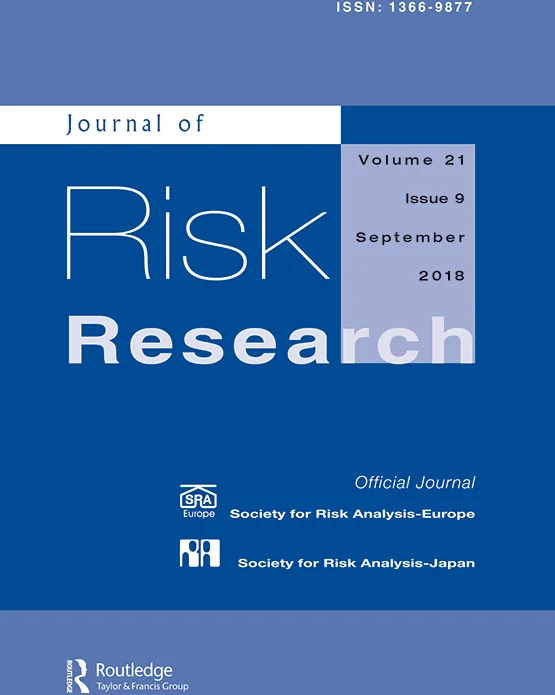Facing nonscalability: are risks still ‘risks’ when compound and catastrophic?
IF 1.7
4区 管理学
Q1 SOCIAL SCIENCES, INTERDISCIPLINARY
引用次数: 0
Abstract
AbstractCrisis intensification and acceleration (e.g. the triple disaster in Fukushima, the COVID-19 pandemic, and the increase in extreme climatic events) have raised new challenges. Recent research went a step further by exploring new types of risks: compound risks. This article examines different definitions of compound risks and identifies their differences and common features. Starting from a definition restricted to the combination of natural hazards, the concept progressively unfolds to include a combination of hazards and local vulnerabilities, including the competition of different resources for mitigating their effects or the effects at different scales. Our article contributes to this theoretical effort. We explore how compound risks are envisioned in the current practices of preparation by actors in charge of risks management and crisis preparation, through 3 cases studies: medium size towns in France, Le Havre and Nantes, facing urban risks; a case study of the COVID-19 pandemic management at the French governmental level; and the doctrines in the case of a nuclear accident. Compound risks are understood in relation to scaling. The change of nature brought by a change of scale is explored through interdependencies, threshold, and rupture effects, which are intertwined with collapse. Are risks and risk management scalable? Compound risks consequences for political response are also studied. They may call for new types of governance, new modes of preparedness, and even new institutions. We conclude that compound risks question the very paradigm of risk management and crisis preparedness and may call for entirely new ways of facing extreme situations that question the very role and agency of politics.Keywords: Compound risksnonscalabilityrisk governanceclimate-related disasters AcknowledgmentsThe primary data for this study were collected through three different fieldworks and projects. The French cities’ data are from one of the author’s PhD research at Paris Est-University and benefited from financial and academic funding of its I-SITE. The Covid-19 data came from the ANR CrisOrg, funded by French Research Agency. Finally, nuclear related data and compound risks data were collected through the ‘UrbaRiskLab’ (URL) Project, funded by Gustave Eiffel University. We presented this work during the LATTS - RUE Seminar on February 8th 2023, and would like to thanks all the members for their helpful comments. Valérie November would like to thank John Stella who was the first to raise her attention on the notion of compound risks, leading to this paper. The views expressed herein are of course the authors’ own.GeolocationFranceDisclosure statementNo potential conflict of interest was reported by the author(s).Notes1 Leading to concern over the risks induced (Joey and Luscia Citation2021), fed by a scientific controversy (Ji et al. Citation2022; Nigel, Brendan, and Tony Citation2023).2 We use ‘governability’ here in a Foucaldian sense: not only the capacity to govern but also the capacity to be governed (Foucault Citation1978).3 The materials of the urban case study of Nantes and Le Havre are extracted from 2018–2021 PhD fieldwork that studied local risk and crisis management policies and tools (31 participatory observations and 72 semi-structured interviews mainly with local authorities and their “risk and crisis” department).4 Those maps are visible here: https://carto.sigloire.fr/1/n_tri_nant2014_044.map5 This case study was investigated within the ANR CrisOrg (Organisations in Crisis) project, which analyzed the responses to the COVID-19 crisis in France nationally (40 interviews conducted in different ministries, mainly Home and Health) and regionally and locally (55 interviews with public agencies, in Health and Civil Security). All the interviewees had high-level positions in their respective organisations.6 The material for the nuclear case is based on revisiting the data collected in the framework of a Franco–Japanese project (Institut de Radioprotection et de Sûreté Nucléaire [IRSN]/Institut d’Études Politiques de Paris [Sciences Po]/Tokyo Institute of Technology [Tokyo Tech]) and on interviews with experts and counter-experts of the domain. Interviews comprise governmental organizations (such as Japan Atomic Energy Commission, Reconstruction Agency, Cabinet office, etc.), local institutions (such as mayors from the Fukushima prefecture), NGOs (such as Group Action Hiroshima, Chirukin-sha, etc.). Complete list of interviews in the SHINRAI report (see: References).7 We prefer to use the term « government » when referring to the nuclear domain, following the claim made by Topçu that this technology is regulated in a very centralized, state based and authoritarian way (Topçu Citation2019).8 Interview of Genyù Sokiù, writer and director of Miharu temple. (Fukushima Prefecture). Led by C. Fassert and R. Hasegawa.9 Radionuclides have a decay period called ‘half-life’ corresponding to the loss of half of its radioactive potential.10 Junichiro Koizumi, Morihiro Hosokawa, Naoto Kan, Yukio Hatoyama, and Tomiichi Murayama. Letter to Ursula von der Leyen, January 27, 2022.面对不可扩展性:当风险是复合的和灾难性的时,风险仍然是“风险”吗?
摘要危机的加剧和加速(如福岛三重灾难、2019冠状病毒病大流行和极端气候事件的增加)提出了新的挑战。最近的研究更进一步,探索了新的风险类型:复合风险。本文研究了复合风险的不同定义,并确定了它们的差异和共同特征。从一个仅限于自然灾害组合的定义开始,这个概念逐渐展开,包括灾害和地方脆弱性的组合,包括不同资源为减轻其影响或不同规模的影响而进行的竞争。我们的文章有助于这一理论上的努力。我们通过三个案例研究,探讨了风险管理和危机准备的参与者在当前的准备实践中是如何设想复合风险的:面对城市风险的法国中型城镇勒阿弗尔和南特;法国政府层面COVID-19大流行管理案例研究;以及在核事故情况下的理论。复合风险的理解与规模有关。尺度变化所带来的自然变化是通过相互依赖、阈值、破裂效应来探索的,这些效应与崩塌交织在一起。风险和风险管理是否可伸缩?本文还研究了政治应对的复合风险后果。它们可能需要新的治理方式、新的准备模式,甚至新的机构。我们的结论是,复合风险对风险管理和危机准备的模式提出了质疑,可能需要全新的方式来面对极端情况,这对政治的作用和机构提出了质疑。关键词:复合风险、不可扩展性、风险治理、气候相关灾害法国城市的数据来自作者在巴黎Est-University的一项博士研究,并受益于其I-SITE的财政和学术资助。新冠病毒的数据来自法国研究机构资助的ANR CrisOrg。最后,通过Gustave Eiffel大学资助的“UrbaRiskLab”(URL)项目收集核相关数据和复合风险数据。我们在2023年2月8日的LATTS - RUE研讨会上介绍了这项工作,并感谢所有成员提供的有益意见。valsamrie November要感谢John Stella,他是第一个引起她对复合风险概念关注的人,导致了这篇论文的发表。这里表达的观点当然是作者自己的。geolocationfrance披露声明作者未报告潜在利益冲突。注1:由于科学上的争议(Ji et al.),导致对风险的担忧(Joey和Luscia Citation2021)。Citation2022;奈杰尔、布伦丹和托尼我们在这里使用福柯式意义上的“治理能力”:不仅是治理的能力,也是被治理的能力(福柯引文,1978)3 .南特和勒阿弗尔城市案例研究的材料摘自2018-2021年博士实地考察,研究了当地风险和危机管理政策和工具(31次参与性观察和72次半结构化访谈,主要与地方当局及其“风险和危机”部门)该案例研究是在ANR CrisOrg(危机中的组织)项目中进行的,该项目分析了法国对COVID-19危机的反应(在不同部委进行了40次访谈,主要是家庭和卫生部)以及区域和地方(在卫生和民事安全部门对公共机构进行了55次访谈)。所有的受访者都在各自的组织中担任高层职务核能案例的材料是基于对法日合作项目(Institut de Radioprotection et de s<s:1> retrenucleacemaire [IRSN]/Institut d ' Études Politiques de Paris [Sciences Po]/Tokyo Institute of Technology [Tokyo Tech])框架内收集的数据的重新审视,以及对该领域专家和反专家的采访。访谈对象包括政府机构(如日本原子能委员会、重建机构、内阁府等)、地方机构(如福岛县市长)、非政府组织(如广岛团体行动、Chirukin-sha等)。SHINRAI报告中访谈的完整清单(见:参考资料)在提到核领域时,我们更喜欢使用“政府”一词,因为top认为这项技术是以非常集中的、以国家为基础的、专制的方式进行监管的(topcitation2019)采访《三春寺》的编剧兼导演Genyù Sokiù。(福岛县)。由C. Fassert和R. Hasegawa领导。
本文章由计算机程序翻译,如有差异,请以英文原文为准。
求助全文
约1分钟内获得全文
求助全文
来源期刊

Journal of Risk Research
SOCIAL SCIENCES, INTERDISCIPLINARY-
CiteScore
12.20
自引率
5.90%
发文量
44
期刊介绍:
The Journal of Risk Research is an international journal that publishes peer-reviewed theoretical and empirical research articles within the risk field from the areas of social, physical and health sciences and engineering, as well as articles related to decision making, regulation and policy issues in all disciplines. Articles will be published in English. The main aims of the Journal of Risk Research are to stimulate intellectual debate, to promote better risk management practices and to contribute to the development of risk management methodologies. Journal of Risk Research is the official journal of the Society for Risk Analysis Europe and the Society for Risk Analysis Japan.
 求助内容:
求助内容: 应助结果提醒方式:
应助结果提醒方式:


